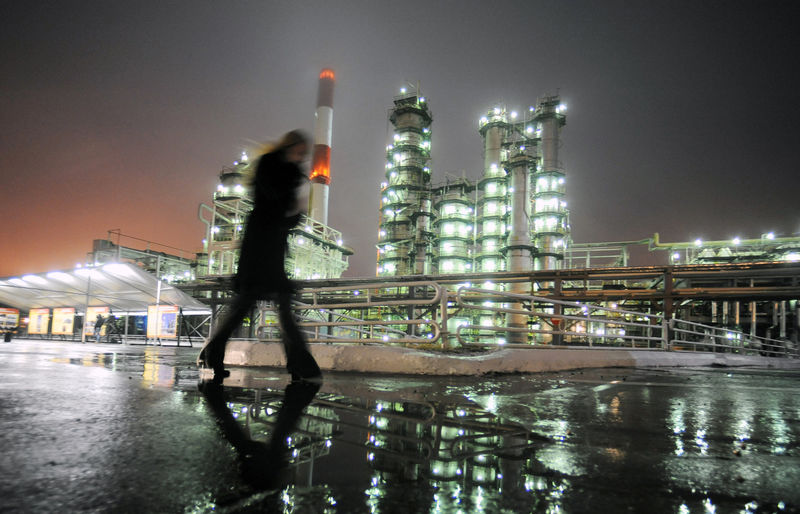(Adds comments from Suncor Energy and MEG Energy)
By Jarrett Renshaw
NEW YORK, Feb 9 (Reuters) - U.S. independent refiners like Phillips PSX.N and Valero VLO.N have offered mixed support for Republican efforts to boost American jobs and products, expressing concerns about how a border tax on imports could upend the energy ecosystem.
The comments by refining executives in a wave of recent earnings calls offer the first glimpse of the balancing act U.S. refiners must perform under the Trump Administration: Applaud pro-business proposals while raise alarms about protectionist policies that may hurt American consumers and perhaps their own balance sheets.
Congressional Republicans and the Trump administration are considering a basket of tax reforms, the centerpiece of which is a 20 percent tax on imports, to try to drive domestic manufacturing and energy industry growth. The tax would be offset by cutting income taxes on exports. executives warned the reforms would have significant consequences for the U.S. refining industry that imports around 40 percent of its daily crude oil needs, and the consumer was most likely the one to get hit.
"If it were to pass, we'll be able to be flexible. We'll be able to move the price onto the consumer," Marathon Petroleum (NYSE:MPC) Chief Executive Gary Heminger said.
GAS UP 30-40 CENTS ON BORDER TAX
It is not clear that refineries would easily be able to absorb more U.S. light, sweet crude when many of them are designed to refine heavier grades of oil from Canada and Saudi Arabia.
Phillips 66 (NYSE:PSX) is among the largest buyers of the roughly 3.3 million barrels per day of Canadian crude that flows into the United States. Phillips CEO Greg Garland said last week that Canadian producers at the moment need U.S. buyers to survive and will need to adjust to any border tax.
"Short-term, I'm not sure where the Canadian crude goes, I think it's got to drain south. Longer-term, I think options can be developed for that. So I don't think we're worried about the Canadian crude going away, but it will have to price such that the refiners run it," Garland said.
The company imports roughly 1 million bpd of crude oil. It could replace about 400,000 bpd of that with domestic barrels, but ultimately they and other refiners need to look outside the borders.
"The heavy crudes, the availability is not really there," said Phillips 66 president Tim Taylor.
Valero said they can run between 600,000 to roughly 1 million barrels per day of light domestic crude in their 3 million bpd network, giving them flexibility to respond.
Executives noted that they have made investments in recent years to increase their product export capacity, which would yield higher returns if exports were tax free. U.S. products exports have risen dramatically in recent years.
Canadian oil company executives said they were cautiously optimistic any border tax would not be as punishing as some have envisioned because of U.S. demand for Canadian heavy oil.
Bill McCaffrey, chief executive of oil sands producer MEG Energy MEG.TO , also said Canada's position as a major importer from the United States would provide an incentive for the two countries to work together.
"Then when I look at energy, Trump has been very focused on the idea of reducing exposure to the Middle East," McCaffrey said on an earnings call on Thursday. "You're going to want to count on Canada to be part of that energy equation."
Steve Williams, CEO of Canada's largest producer Suncor Energy SU.TO , said Canada had a very healthy symbiotic trade relationship with the United States.
"The probability of a border tax as we're currently thinking about it is very low," Williams said on Suncor's results call.
The border tax proposal still faces hurdles. Big U.S. retailers that rely on imports oppose it, President Donald Trump has sent mixed signals, and some U.S. Senate Republicans question whether it would pass muster under international trade rules. tax reform would have a disproportionate effect across the country. Refiners on the East and West Coast who lack direct access to U.S. pipelines and rely more on imports would have less flexibility to shift crude slates than their Gulf Coast counterparts. Companies without significant product export operations would not be able to offset the new import tax costs.
"We think crude prices go up 25 percent. We think gasoline prices go up 30 to 40 cents a gallon in that scenario. We're worried about demand destruction in that case and what happens," Garland said.
(Additional reporting from Nia Williams in Calgary; Editing by Andrew Hay and Meredith Mazzilli)
